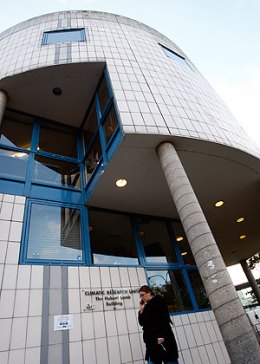
This is a Dec. 10, 2009 file photo showing the Climatic Research Unit at the University of East Anglia in Norwich, England. East Anglia, where stolen emails caused a global climate science controversy in 2009
There are exactly two lessons I can immediately draw from what’s being called Climategate 2, the apparent hack and release of thousands of emails between climate scientists.
One: get a better email password! This cache of emails was taken from the hard drives of the CLimatic Research Unit at the University of East Anglia in Britain, most likely in the same theft that netted the thousands of emails released right before the Copenhagen climate summit two years ago. All of this drama—and the negative impact the original Climategate had on the global perception of climate science—might have been avoided with some decent digital cryptography. So right now, dear reader, immediately go read James Fallows’s piece on email hacking in the Atlantic. (I’ll wait.) And then read this Slate post on how to easily come up with unbreakable passwords.
Two: the good constables of Norfolk, who have been investing at the hack at East Anglia, are in no danger of giving Sherlock Holmes a run for his money. Seriously, it’s been two years since the original Climategate, and as Richard Black points out in the BBC, they’ve apparently got bupkis, or whatever the British equivalent of that would be. And the investigation doesn’t exactly seem to be on the frontburner—as Black writes, the police have spent all of $8,843 on the investigation.
Otherwise the new batch of emails seem to add little to what was raised two years ago. Climate scientists—especially when you quote selectively from emails they think are not for public viewing—can be hypersensitive to criticism and clannish. Within the climate science world, there are clearly differences of opinions on aspects of climate science, on the certainty of models and on the confidence we can have in any sweeping assessment of global warming. Those differences come out in the emails, sometimes very bluntly—but that to me isn’t evidence of some kind of international conspiracy, but rather the not always pretty process of science and collective decision-making happening in real time.
Here’s an example: in the Washington Post, Juliet Eilperin quotes one of the hacked emails:
An official from the U.K. Met Office [Peter Thorne], a scientific organization which analyzes the climate, writes to the Climate Research Unit’s then-director Phil Jones at one point: “Observations do not show rising temperatures throughout the tropical troposphere unless you accept one single study and approach and discount a wealth of others. This is just downright dangerous. We need to communicate the uncertainty and be honest. Phil, hopefully we can find time to discuss these further if necessary […]”
Later, the official adds, “I also think the science is being manipulated to put a political spin on it which for all our sakes might not be too clever in the long run.”
That might sound bad, although again, this appears to be part of a back-and-forth. But as Jocelyn Fong of the liberal press watchdog group Media Matters writes, these emails were sent in February 2005 and were discussing a first draft of what would become part of the Intergovernmental Panel on Climate Change assessment. The final version of the chapter the two scientists were quarreling about seemed to reflect Thorne’s concerns, and cited his research several times. Isn’t that what this process supposed to be about?
Of courses, groups like Climate Progress and the Union for Concerned Scientists were quick to assure everyone that there was nothing to see in the emails—a little too quick, given that the hack was only published this morning and contained more than 5,000 emails. And of course, they instantly went on the offensive against reporters writing just about anything on the emails. It’s true that some media outlets blew the original Climategate emails out of proportion, and that others will no doubt do so this time around. (Hello, Fox News! There you are, Daily Telegraph!) One thing I’m sure the latest email controversy will do is reinforce the belief among many in the environmental community that messaging—and the media—is the real reason the world has failed to get more than a foothold on climate policy. As an MSMember, I’m biased, but that explanation has never worked for me.
And as Andrew Revkin points out on Dot Earth, there were legitimate concerns raised in the original emails about the IPCC process—and how closed it could be to dissenting voices. But inquiry after inquiry showed that there was little more to the emails than that, and cleared scientists involved in the imbroglio like Michael Mann. The more balanced recent IPCC report on natural disasters had a wider variety of voices, and pleased even longtime critics. Ultimately, the emails are a sideshow—and the unhappy result that’s almost certainly to come at the UN climate summit in Durban, which begins next week, will have little to do with them. But that’s for later.


